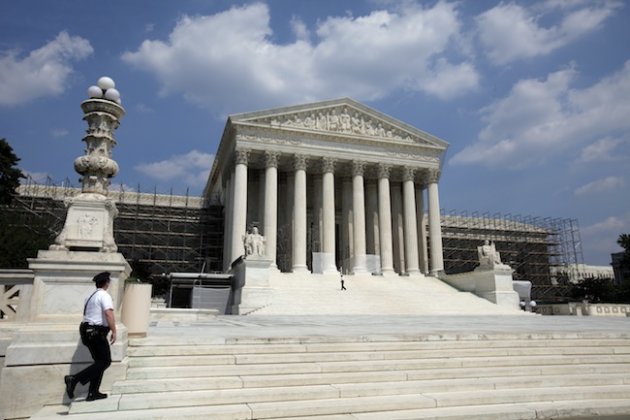
The US Supreme Court has said President Barack Obama’s landmark healthcare reform act is constitutional.
The court upheld a core requirement known as the “individual mandate” that Americans buy insurance or pay a fine.
Of the nine justices on the bench, Chief Justice John Roberts’ vote was decisive in the Supreme Court’s 5-4 ruling in favour of the law.
The ruling comes months before the US election, with Republicans vowing to push for a repeal of the bill.
Healthcare is a deeply polarising issue in the US and Republicans strongly opposed Mr Obama’s legislation.
The state of Florida, along with 12 other states, filed a legal challenge to the bill minutes after Mr Obama signed The Patient Protection and Affordable Care Act (ACA) into law in March 2010.
They were later joined by 13 more states, the National Federation of Independent Businesses and several individuals.
Congressional leaders responded quickly to the verdict. Senate Minority Leader Mitch McConnell, a Republican, said: “We’ve passed plenty of terrible laws around here that were constitutional.”
On the Senate floor, he said the only way to fix the law was “full repeal”.
Meanwhile, the Senate’s Democratic majority leader, Harry Reid, disagreed: “Now that this matter is settled, let’s move on to other things. Like jobs.”
Mr Obama is due to speak on the court’s verdict at 12:15 (18:15 GMT) and Mitt Romney, his Republican opponent in the presidential elections, is expected to speak before that at 11:45.
‘Triggering a tax’
The mandate was eventually upheld by the justices, citing the taxation powers granted to Congress by the US constitution.
A majority of justices agreed that the penalty individuals must pay if they refuse to buy health insurance falls within Congress’ power to levy taxes, upholding the “individual mandate”.
Who’s uninsured?
- Nearly 50 million, or 16.3%of Americans are uninsured
- By ethnicity, the rate of those who lack insurance is
- 15.4% White
- 20.8% Black
- 18.1% Asian
- 30.7% Hispanic
- Source: US Census Bureau
The government’s main argument was that the law was legal under Congress’ ability to regulate “interstate commerce” – but a majority of justices did not agree with this view.
“The mandate can be regarded as establishing a condition – not owning health insurance – that triggers a tax – the required payment to IRS,” Justice Roberts wrote.
While the court described the penalty as a tax, it did not invoke a law that could have prevented the justices from ruling on the case.
Under a law called the Anti-Injunction Act, taxes cannot be legally challenged until after they have been levied. This could have delayed a verdict till 2015 – after the “individual mandate” comes into effect and the first round of penalties have been paid.
They were also not required to rule on the issue of “severability”, which would determine whether other parts of the healthcare law could stand even if the mandate was struck down.
Medicare clause limited
In addition to the individual mandate, the Supreme Court was asked consider another part of the law that deals with the expansion of Medicaid, a government healthcare programme for low-income citizens.
The court ruled to limit that provision but did not strike it down altogether.
“Nothing in our opinion precludes Congress from offering funds under the ACA to expand the availability of health care, and requiring that states accepting such funds comply with the conditions on their use.
“What Congress is not free to do is to penalize States that choose not to participate in that new program by taking away their existing Medicaid funding,” the Supreme Court’s opinion said.
But four justices dissented with the court’s ruling.
“In our view, the entire Act before us is invalid in its entirety,” Justice Anthony Kennedy said.










